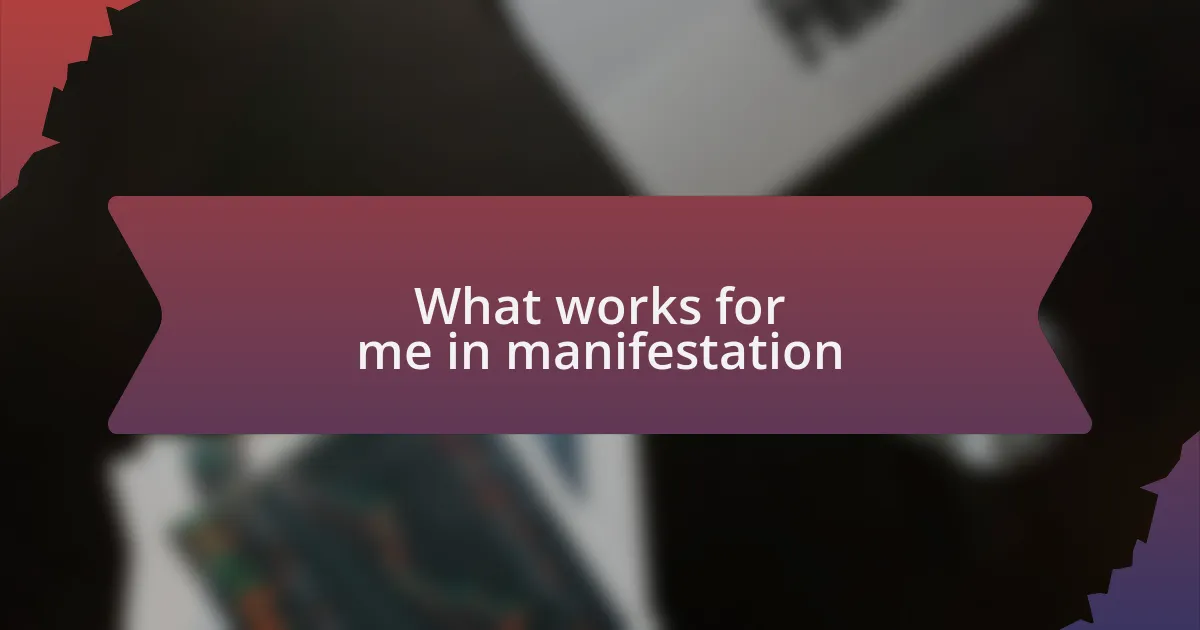Key takeaways:
- Dream interpretation offers insights into our emotions and life situations, helping us understand and address personal anxieties and unresolved feelings.
- Common methods of dream analysis include exploring symbols, analyzing emotions, and viewing dreams as narratives that reflect our life journeys.
- Personal techniques for interpreting dreams include journaling, meditation, and discussing dreams with others to gain new perspectives.
- Recurring dream themes often highlight unresolved issues and can guide personal growth by encouraging reflection on one’s waking life challenges.
Author: Evelyn Hartman
Bio: Evelyn Hartman is a contemporary author known for her evocative storytelling and rich character development. With a background in psychology, she weaves intricate narratives that explore the complexities of human relationships and personal growth. Her debut novel, “Whispers in the Wind,” garnered critical acclaim and established her as a powerful voice in modern literature. Evelyn resides in the Pacific Northwest, where she draws inspiration from the vibrant landscapes and diverse communities around her. When she’s not writing, she enjoys hiking, gardening, and spending time with her two rescue dogs.
Understanding dream interpretation
Dream interpretation is more than just deciphering symbols; it’s a gateway into our innermost thoughts and feelings. I remember a vivid dream where I was running away from an unseen force. At first, I brushed it off, but later, I realized it reflected my anxiety about an upcoming life change. Have you ever had a dream that felt too personal to ignore?
When we delve into our dreams, we often find connections to our daily life. For instance, dreams about flying might symbolize a desire for freedom or escape from constraints. Isn’t it fascinating how our subconscious informs us about our emotional state? Reflecting on these symbols can provide clarity and understanding, guiding our personal growth.
Each person’s dream language is unique, shaped by their experiences and emotions. I’ve found that keeping a dream journal helps unravel patterns and themes that often link back to my waking life. Could documenting your dreams lead to new insights about yourself? Embracing the process of interpretation can truly transform our relationship with our dreams.
Common methods of dream analysis
One common method of dream analysis is the exploration of symbols within dreams. For example, I once dreamed of a locked door, which later made me ponder what I might be avoiding in my waking life. The locked door represented opportunities I was hesitant to pursue. Have you noticed recurring symbols in your dreams that might signify something deeper?
Another approach is to analyze the emotions experienced during the dream. I vividly recall dreaming of losing a loved one, and the profound sadness I felt lingered long after waking. This emotional aftermath highlighted unresolved feelings in my life that I needed to address. How often do you reflect on the emotions tied to your dreams?
Lastly, many people benefit from narrative analysis, where they consider their dream as a story. One night, I dreamed I was sailing through stormy seas, which mirrored the chaotic phases I was navigating in my career. Viewing dreams as narratives allows us to see them as reflections of our journeys. Do you think your dreams tell a story about your current life chapter?
Personal techniques for dream interpretation
When it comes to interpreting my dreams, I often use a journal to jot down my thoughts immediately after waking. For instance, once I had a dream where I was being chased by shadows, and writing about it helped me connect those shadows to feelings of anxiety in my daily life. Have you tried capturing your dreams in a journal? It can be an insightful first step to untangling their meanings.
Another technique I find effective is meditation. After a particularly vivid dream about soaring through the sky, I took time to meditate on that experience. The sensation of freedom and release spoke volumes about my desire for change. How do you typically process the emotions your dreams evoke? Meditation can provide clarity and allow those emotions to surface more profoundly.
Lastly, I appreciate the power of discussing dreams with friends or fellow dream enthusiasts. I once shared a bizarre dream involving a talking cat with a friend, and through our conversation, I uncovered my fear of losing control in certain situations. Talking it out often leads to unexpected insights. Have you found that discussing your dreams has opened new perspectives for you?
My favorite dream symbols
One of my favorite dream symbols is water. I recall a dream where I stood on the shore of a tranquil lake, water lapping gently at my feet. It felt calming, and later I realized it represented my emotional state—deep, yet serene. Have you ever noticed how water can evoke different feelings in your dreams?
Another symbol that resonates with me is flying. I vividly remember a dream where I effortlessly soared through the clouds, feeling liberated and unbound. That sensation of flight was a reflection of my desire for freedom and ambition in my waking life. Isn’t it fascinating how such a simple act can symbolize so much about our aspirations?
Lastly, I find animals as powerful dream symbols. I once dreamed of a wise old owl watching over me, and this led me to reflect on the wisdom I seek in my decisions. Animals often embody specific traits and insights relevant to our lives. Have you considered what animal symbols might be appearing in your dreams?
Applying dreams to daily life
Dreams have an uncanny way of reflecting our daily lives, offering insights that can sometimes go unnoticed in our waking hours. I remember a particularly vivid dream about losing my keys. When I woke up, it struck me that I had been feeling lost and uncertain about my next steps in life. Have you ever considered how a dream about misplacing something might mirror your feelings of disorganization or unresolved issues?
Another instance that stands out for me is a dream where I found myself in a labyrinth, searching for a way out. The experience felt both overwhelming and enlightening. Reflecting on it later, I realized that it was a metaphor for the decisions I faced at the moment. I was navigating a complicated situation in my career, and the maze depicted my struggle to find clarity. How often do we overlook the deeper meanings lurking in moments of confusion?
I’ve also noticed recurring themes in my dreams, such as being chased. Initially, I felt anxious when I awoke from these dreams. However, through reflection, I began to understand that they represented unresolved fears and pressures I encountered daily. By acknowledging these feelings, I found a pathway to address the sources of my stress. Can you think of a recurring dream that might be urging you to confront something in your own life?





